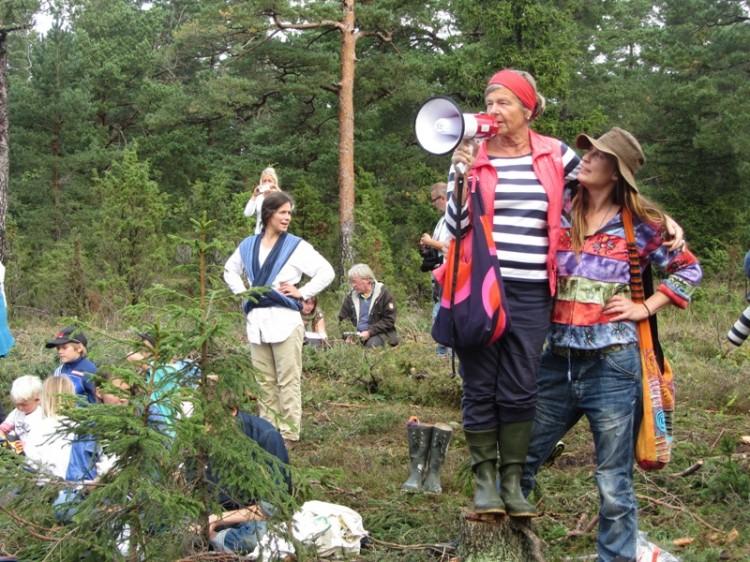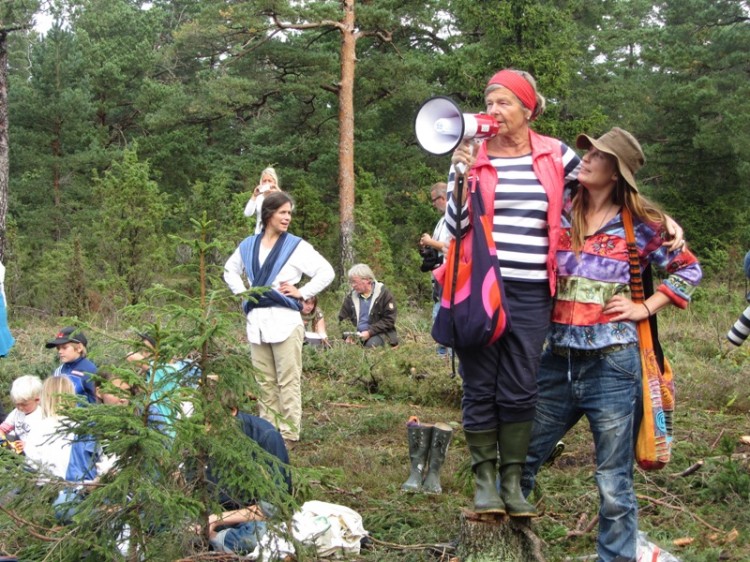GOTLAND, Sweden—On Saturday, nature’s defenders won a small victory on the Swedish island of Gotland in the Baltic Sea, where the struggle by environmentalists and locals to stop a limestone quarry has snowballed into one of the leading national issues of the past weeks.
Mellanskog, the forestry association responsible for clearing away the forest for the 420-acre quarry announced it will stop its work, pending a supreme court decision, since it wanted to avoid division and bitterness with the locals, many of whom are members of the association.
The protesters, who set up camp weeks ago, welcomed the decision and plan to stay until the project is canceled altogether. Despite their determination, the atmosphere at the camp has been very friendly with younger people helping to carry the older ones in because of closed roads, and relations with police remained lighthearted.
What began as this small protest, has gained momentum, eventually becoming a national issue.
“Unilaterally breaking the contract and stopping the clearing showed some real character on the part of Mellanskog,” said local Ann Marie Hellstrom, who is active in the campaign to save the area. She said that she was very happy and hoped that the Supreme Court would now do the right thing and stop the quarry altogether.
The area, Ojnareskogen, was slated to become Sweden’s 30th national park. Finnish company Nordkalk bought the relatively small area planned for the actual quarry for about $10,000, but now estimates there is $6 billion worth of lime in the ground. The problem, say environmentalists, is that runoff from the quarry will endanger the entire area that has 255 red-listed species, three of which are only found in this particular area.
Locals are also worried about their water. Sheep and horse farmer Gerty Dahlbom-Jonsson, who lives nearby, is worried that the quarry will destroy her living conditions.
“I was born on a farm close to the Klinthagen quarry [an existing Nordkalk quarry] and I’ve seen how that area was devastated, and people lost their water supply,” she said, adding that she tries to go to the protest site as much as possible.
The planned quarry is next to the largest nature reserve on the island, containing its largest freshwater lake. Protest coordinator Lisa Wanneby says freshwater sources in the European Union-protected wetlands are threatened.
“Nordkalk says it will release ‘purified water’ into the area. That’s what they call it nowadays. They used to call it ‘waste water,’ I preferred that,” she said.
Nordkalk was allowed by the Swedish environmental court to start the quarry in July, but Swedish environmental organizations claim that this is in violation of both Swedish and EU regulations. The court had previously rejected the application to start the quarry, based on the exact same information. The case is now in the Supreme Court, but the company was allowed to go ahead with the plans, pending the decision. No date for the decision has yet been announced.
The process, however, has been criticized. Swedish environmental magazine Miljoaktuellt wrote that according to sources, one of the judges later went on to become a consultant for Nordkalk.
The Epoch Times publishes in 35 countries and in 19 languages. Subscribe to our e-newsletter.






